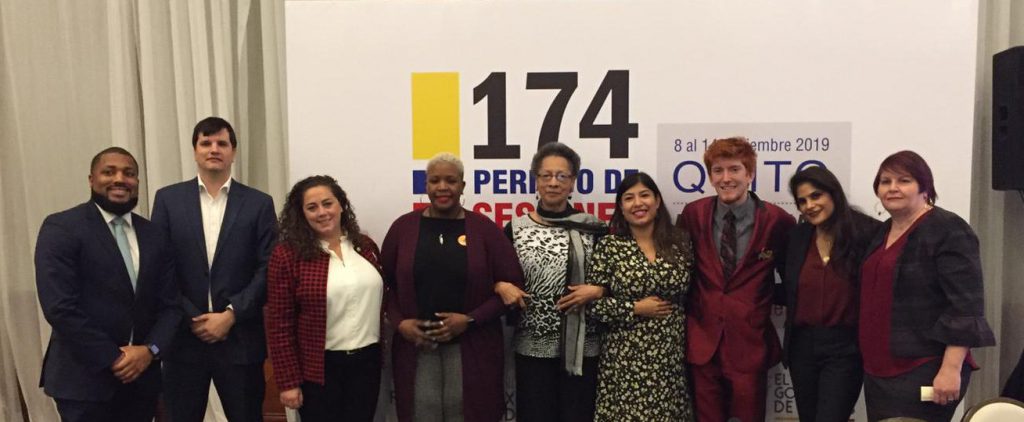
Madaline George, Harris Institute Fellow and lead researcher at the Institute’s Gun Violence and Human Rights Project, testified before the Inter-American Commission on Human Rights (IACHR) during its 174th Period of Sessions on November 12 in Quito, Ecuador. Ms. George spoke at a hearing on The Impact of Gun Violence in the United States. She presented alongside representatives from Amnesty International, the Center for American Progress, and several victims and survivors of gun violence.
The Commission granted this hearing as a result of a petition submitted by the Harris Institute, Amnesty International, the Center for American Progress, and Igarapé Institute. This coalition first testified before the Commission in February 2018 in a hearing on The Regulation of Gun Sales and Social Violence in the United States, held in Bogotá, Colombia in the weeks following the Marjory Stoneman Douglas High School shooting in Parkland, Florida.
Ms. George explained that since the Parkland shooting, the U.S. government has consistently failed to fulfill its international human rights obligation to protect its population against gun violence. The U.S. Senate has refused to call a vote on two significant gun control bills passed by the U.S. House of Representatives in February 2019 and has stalled an appropriations bill passed by the House in June 2019 which would allocate $50 million for gun violence research. Moreover, the Trump administration has rolled back U.S. firearm export regulations, attempted to un-sign the U.N. Arms Trade Treaty, and has failed to adequately respond to U.S. school shootings.
Several individuals who have directly suffered from gun violence testified at the hearing, giving voice to the experience of losing a child to random urban violence, surviving a school shooting, having a child disappeared by state officials, and being the victim of domestic violence. Victims urged the U.S. government to close loopholes in federal law, fund research on violence prevention, provide support for affected individuals and communities, and take responsibility for its failures to protect others like them. Dr. Laurie Punch, a trauma surgeon at Washington University School of Medicine, explained the ongoing physical and mental repercussions brought on by gun violence, which she has witnessed firsthand working in Baltimore and St. Louis. Advocates highlighted the particular impact firearm violence has on vulnerable communities, such as women, children, and communities of color, and discussed ways that such violence can be prevented.
The coalition’s joint recommendations included: disarming all domestic abusers, banning assault weapons and high-capacity magazines, adopting legislation requiring universal background checks, and requiring safe firearm storage. The coalition also requested that the Commission draft a report on gun violence in the United States, including recommendations on how the United States can best address this issue and meet its human rights obligations.
The Commissioners expressed gratitude to the survivors and victims who shared their stories and recognized the “urgent need to reduce gun violence,” particularly in light of the strong evidence presented demonstrating that more guns equate to more violence and that this violence is, indeed, preventable.
Commissioner Flávia Piovesan critiqued the U.S. representatives at the hearing for not offering “specific measures to prevent, to reduce, and to regulation gun violence, especially taking into consideration special protections to the ones that are the target . . . women, the young, [and] African descendants.” IACHR President Margarette May Macaulay questioned “why has the United States federal government . . . not done any research on the impact and effect of gun violence on its citizens?” and urged the United States to accept that it has a legal duty, as a State, to protect its citizens from violence. She highlighted that the ability of a private individual in the United States to commit violence against others is linked to U.S. laws and the implementation of those laws on the ground. The Commissioners further focused on the State’s failure to provide much-needed support and reparations to survivors, including for mental health concerns linked to gun violence.
A video of the hearing is available here: https://www.youtube.com/watch?v=7oX5cnpTEMY.
